Jimmy watches Countdown and tries to ignore his bills, grief, COPD and frailty. Meanwhile, his carer walks a tightrope between kindness and reality
A litmus test in France’s roiling hostilities
‘Delivered in quantity, a light marinade of pouty dialectics douses the book,’ writes FIONA O’CONNOR

 RACE HOSTILITIES: Pan-European white supremacists of Generation Identitaire march in France in 2017
[Pulek1/CC]
RACE HOSTILITIES: Pan-European white supremacists of Generation Identitaire march in France in 2017
[Pulek1/CC]
Annihilation
by Michel Houellebecq, translated by Shaun Whiteside
Picador, £11
FRENCH master in the art of dissing everyone, Michel Houellebecq has written his longest book and claims it will be his last.
Published in France in 2022, Annihilation has taken a while to emerge in English. It reads somewhat like a Covid project — that lockdown feel of ennui, aimless and boring for long, long passages is there.
Approaching his retirement, Shakespeare imagined every third thought being of death. For Houellebecq, now 68, every three pages or so gets animated by thoughts of sex.
Similar stories

French feminists salute Gisele Pelicot as her husband and 50 other rapists are jailed













